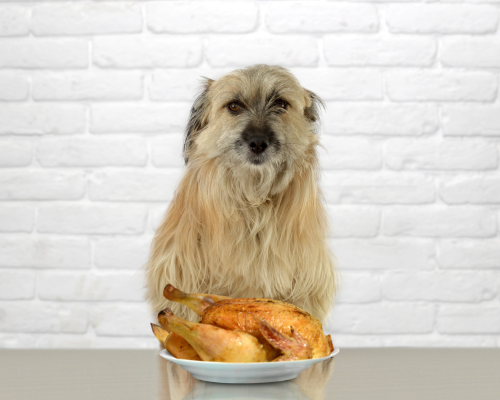Can Dogs Eat Rotisserie Chicken? What You Need To Know!
Can Dogs Eat Rotisserie Chicken? What You Need To Know!

Vet Reviewed

By: Sarah Hodgson
December 23, 2023
- Posted in Can Dogs Eat
Table of Contents
We all love chicken and believe me when I say this our dogs love chicken even more. So now when it comes to a rotisserie chicken can you feed that to your dogs? Is it safe? After all, what is the problem it's chicken.
In this article, we will explore everything you need to know about feeding your dog rotisserie chicken.
Let's dive in!
What Is Rotisserie Chicken?
For those of you who might not know, rotisserie chicken is a flavorful and juicy chicken that is cooked on a rotating spit, resulting in a crispy skin and tender meat.
It is often seasoned with herbs and spices, making it a tasty treat for us humans. However, it's important to consider the potential risks and benefits before sharing it with your dog and this goes for any human food.
Is Rotisserie Chicken Safe For Dogs?
While dogs can technically eat rotisserie chicken, it's important to exercise caution.
Yes, dogs can eat rotisserie chicken as long as it's plain with no seasonings, bones, or skin. As all those can be harmful to dogs causing health issues.
The main concern lies in two things the seasoning and cooking methods used and the skin and bones. We'll first go over the skin and bones.
When it comes to the skin and bones it's crucial to remove the skin and any bones. The skin is often seasoned with salt, spices, and oils, which can cause digestive upset or even pancreatitis in dogs. Bones, especially small ones, can pose a choking hazard or cause intestinal blockage. Always ensure that the chicken is thoroughly cooked and free from any harmful additives before offering it to your dog.
When it comes to the seasonings many store-bought rotisserie chickens are seasoned with ingredients like garlic and onion powder, which can be toxic to dogs in large quantities. Additionally, the high sodium content in some rotisserie chickens can be harmful to dogs, especially those with underlying health conditions such as kidney disease or heart problems.

Can You Feed The Skin Of Rotisserie Chicken To Your Dog?
While the meat of rotisserie chicken can be a good source of protein for dogs, the skin should be avoided.
The skin is often high in fat and can lead to weight gain or digestive issues in dogs. Additionally, the seasoning used on the skin may contain ingredients that are harmful to dogs, such as garlic or onion powder. It's best to remove the skin before giving rotisserie chicken to your dog.
Are There Benefits To Feeding Rotisserie Chicken To Your Dog?
Feeding rotisserie chicken to your dog in moderation can have indeed have some benefits.
- The chicken meat is a good source of lean protein, which is important for muscle development and overall health.
- It provides important nutrients such as vitamins B6 and B12, niacin, and selenium. These nutrients support a strong immune system and contribute to healthy skin and coat.
- Plain, boneless, and skinless rotisserie chicken is easily digestible, making it great for dogs with sensitive stomachs or those recovering from illness.
Rotisserie chicken can also be a great option for dogs with picky appetites or those recovering from an illness or surgery. The flavorful and moist meat may entice them to eat, ensuring they receive the necessary nutrition.
Note
It's important to remember that rotisserie chicken should only be given as an occasional treat and not as a substitute for a balanced and complete dog food.
What Are The Risks of Feeding Rotisserie Chicken to Your Dog?
While there are potential benefits to feeding rotisserie chicken to your dog, it's important to be aware of the risks involved as there are risks. As mentioned earlier, the seasoning and cooking methods used in rotisserie chicken can be harmful to dogs. Ingredients like garlic and onion powder can cause toxicity, leading to symptoms such as vomiting, diarrhea, and even anemia.
The high sodium content in some rotisserie chickens can also be problematic for dogs, especially those with certain health conditions. It can contribute to high blood pressure and put strain on the kidneys and heart. Additionally, the fat content in the skin and meat of rotisserie chicken can lead to weight gain and obesity in dogs.
But the main concern should be the bones and skin which are both super hazardous as we mentioned previously.
Should I Be Worried If My Dog Ate Rotisserie Chicken?
If your dog accidentally consumed a small amount of rotisserie chicken without any seasoning or harmful additives, there is likely no cause for immediate concern. However, if your dog ingested a large quantity or if you suspect the chicken was seasoned with ingredients that are toxic to dogs, it's important to monitor for any symptoms of illness.
These may include:
- Vomiting
- Diarrhea
- Abdominal pain
- Weakness
- Changes in appetite or behavior.

When To Contact The Vet
If your dog shows any concerning symptoms after consuming rotisserie chicken, it's important to contact your veterinarian. They will be able to provide guidance based on your dog's specific situation. In some cases, they may recommend inducing vomiting or performing other necessary treatments to prevent any potential complications (never induce vomiting on your own unless your vet tells you to).
Additionally, if your dog has a pre-existing health condition or is on a specialized diet, it's always best to consult with your veterinarian before introducing rotisserie chicken to your dog.
The Bottom Line
So there you have it, while dogs can technically eat rotisserie chicken, it's important to keep in mind the risks involved.
Remember, rotisserie chicken should never replace a balanced and complete dog food. It should be seen as an occasional treat and not a staple in your dog's diet. If you have any concerns or questions about feeding rotisserie chicken to your dog, always consult with your vet for advice. Your dog's health and well-being should always be the top priority.
Frequently Asked Questions
Is it safe to feed my dog bones from rotisserie chicken?
No, it's not advisable to give dogs bones from rotisserie chicken. Bones, especially cooked ones, can splinter and pose a choking hazard or cause internal damage. Opt for boneless chicken to ensure your dog's safety.
How should I serve rotisserie chicken to my dog?
To serve rotisserie chicken to your dog, remove bones, skin, and excess fat. Cut it into small, bite-sized pieces to prevent choking and make it easier for your pet to consume. Remember, moderation is key to maintaining a balanced diet.
Can rotisserie chicken be a regular part of my dog's diet?
While rotisserie chicken can be a occasional treat or addition to your dog's diet, it shouldn't replace their regular dog food. It lacks essential nutrients found in balanced dog diets, so use it as an occasional supplement rather than a primary source of nutrition.
Is it safe to give my dog leftover rotisserie chicken from my own meal?
While it may be tempting to share your leftovers, be cautious. Leftover chicken may have additional seasonings, sauces, or spices that can be harmful. As long as it's plain, unseasoned portions it shouldn't be a problem.

Subscribe to Petfluence!
Get updates on the latest posts and more from Petfluence straight to your inbox.